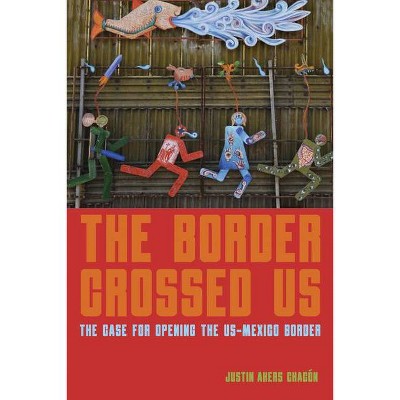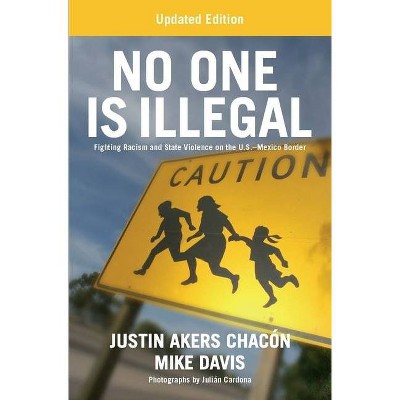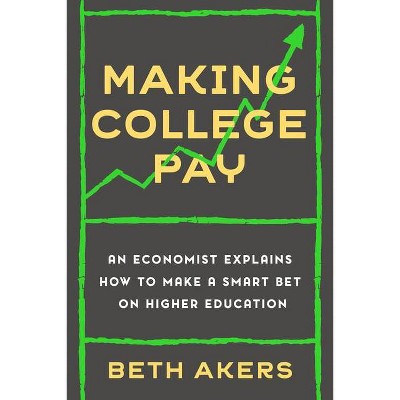The Border Crossed Us - by Justin Akers Chacón (Hardcover)

Similar Products
Products of same category from the store
AllProduct info
<p/><br></br><p><b> About the Book </b></p></br></br><p>A compelling argument that re-building unions requires solidarity with migrant workers and opening borders.</p><p/><br></br><p><b> Book Synopsis </b></p></br></br><p>The aggressive exploitation of labor on both sides of the US-Mexico border has become a prominent feature of capitalism in North America. Kids in cages, violent ICE raids, and anti-immigrant racist rhetoric characterize our political reality and are everyday shaping how people intersect at the US-Mexico border. As activist-scholar Justin Akers Chacón carefully demonstrates, however, this vicious model of capitalist transnationalization has also created its own grave-diggers. <br /><br />Contemporary North American capitalism relies heavily on an inter-connected working class which extends across the border. Cross-border production and supply chains, logistics networks, and retail and service firms have aligned and fused a growing number of workers into one common class, whether they live in the US or Mexico. While money moves without restriction, the movement of displaced migrant workers across borders is restricted and punished. Transborder people face walls, armed agents, detention camps, and a growing regime of repressive laws that criminalize them. Despite the growth and violence of the police state dedicated to the repression of transborder populations--the <em>migra-state--</em>migrant workers have been at the forefront of class struggle in the United States. This timely book persuasively argues that labor and migrant solidarity movements are already showing how and why, in order to fight for justice and re-build the international union movement, we must open the border.</p><p/><br></br><p><b> Review Quotes </b></p></br></br><br><p>"<em>The Border Crossed Us</em> is a meticulously researched manifesto on the US-Mexico border. Justin Akers Chacón masterfully exposes how capital mobility necessarily criminalizes the movement of labor and, with radical and urgent clarity, he calls on all of us to strengthen the movement to open the border." --Harsha Walia, author of <em>Border and Rule: Global Migration, Capitalism, and the Rise of Racist Nationalism <p/></em>"At last, here is a book showing just how critical the demand for the freedom of workers' mobility is to the anti-capitalist movement. Justin Akers Chacón makes the urgent case for a new internationalism, one that openly rejects the divisive, racist, and anti-worker politics upholding national borders. With a clear-eyed examination of how labor repression is the core of the migra-state, Chacón's call for cross-border--and anti-border--organizing is shown to be a necessary part of working class politics everywhere." --Nandita Sharma, author of <em>Home Rule: National Sovereignty and the Separation of Natives and Migrants <p/></em>"This brilliant and timely book, <em>The Border Crossed Us</em>, lays bare the violent extortion and extraction of working-class migrant labor by untangling the hydra of the 'North American Model' of capitalist accumulation. Justin Akers Chacón's incisive temporal and geographic analysis of US capitalist imperialism sets the stage for the urgent and immediate mobilization within labor, migrant, and union organizing across borders. As a scholar activist, Justin Akers Chacón empowers us to sharpen our critique of the border paradox of open borders for capital and closed borders for people, and to finally dismantle and abolish the migra-state, from Free Trade Agreements to detention centers. Our communities depend on it." --Leslie Quintanilla, Co-founder of the Center for Interdisciplinary Environmental Justice and Assistant Professor of Women and Gender Studies at San Francisco State University <p/>"<em>The Border Crossed Us</em> provides a salutary antidote to the stale debate about whether immigration harms the working class. The book offers a convincing and comprehensive account of how the 'half-closed border' between the United States and Mexico gives more power to employers and makes workers on both sides more exploitable. As US capital has inundated Mexico over the past century, increasing its hold on the Mexican economy in the era of free trade, the border has kept Mexican people impoverished and limited their rights and alternatives both at home and in the United States. This book cuts through the distorted nature of our current debates on immigration and makes the most coherent case I've seen for how opening the border will help all workers, on both sides, by giving them the right to organize and fight for a decent life. The border only serves to prevent workers from fighting effectively against capital that has long been transnational." --Aviva Chomsky, author of <em>Undocumented: How Immigration Became Illegal <p/></em>"This book captures the current political moment perfectly. It takes a look at the past and how we arrived at this point, and the crises that have harmed workers on both sides of the border. It also sheds light on the emerging worker movements that have arisen to overcome the ongoing efforts by capitalist industries to prevent or break grassroots and independent worker organizing. The question of open borders is one that we as workers have to ask ourselves. The borders are already open to finance, products, capital, and wealth, but remain closed for the people who create the wealth through our labor. Yet, it is more than just a labor issue. It is a human right to migrate, and to stay home as well. Our union congratulates Justin for writing a book that is asking the questions we have always had to contend with, while also discussing and proposing a better world for all workers." --Edgar Franks, political director of independent, Washington State-based farmworker union, Familias Unidas por la Justicia <p/>"In <em>The Border Crossed Us</em>, Justin Akers Chacón asks--and answers--the hard questions about how the corporate capitalist class has been using border militarization and violent immigration enforcement to squeeze every last bit of profit out of workers, casting aside their dignity and humanity along the way. Chacón does the necessary work of staring hard into the everyday reality of people trampled by the border machine. This is an essential addition to border studies, as convincing--of the need to open borders--as it is compelling." --John Washington, author of <em>The Dispossessed: A Story of Asylum at the US-Mexican Border and Beyond <p/></em>"If you want to understand why international borders are open for the corporate-class, while slammed shut for migrant workers, this excellent, incisive, thoroughly-researched, and thought-provoking book is for you. In <em>The Border Crossed Us, </em> Justin Akers Chacón addresses precisely what most discussions on open borders lack: how their enforcement is entrenched in capitalism and the free market system. He makes clear that there is no 'security' or 'protection' in militarized divisions, that borders need to be broken down for the sake of humanity's collective wellbeing, and that it is a working-class, cross-border solidarity movement that can lead us to justice." --Todd Miller, author of <em>Empire of Borders: The Expansion of the US Border Around the World</em></p>"[The] deadly contradiction of the capitalist trade infrastructure has been written about many times, especially its place in the relationship between Mexico and the United States. Few writers, however, have covered it as explicitly and concisely as scholar Justin Akers Chacón does in his most recent work." --Ron Jacobs, <i>Counterpunch</i><br><p/><br></br><p><b> About the Author </b></p></br></br><p><strong>Justin Akers Chacón</strong> is an activist, labor unionist, and educator living in the San Diego-Tijuana border region. He is a Professor of Chicana/o History at San Diego City College. His other books include <em>No One is Illegal</em> (with Mike Davis) and <em>Radicals in the Barrio</em>.</p>
Price History
Price Archive shows prices from various stores, lets you see history and find the cheapest. There is no actual sale on the website. For all support, inquiry and suggestion messagescommunication@pricearchive.us



















